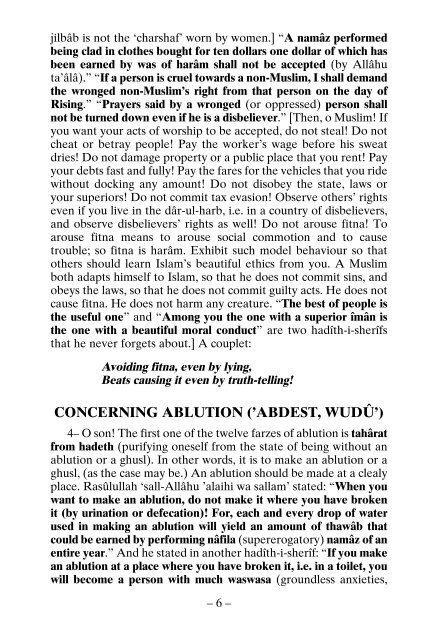O Son !
THE BOOK ‘O SON’ Al-hamdu lillâhi Rabbil ’âlamîn. Wa-s-salâtu wa-s-salâmu ’alâ Rasûlinâ Muhammadin wa Âlihi wa Sahbihi ajma’în. 1– O son! Collecting from books written by the scholars of the Hanafî Madhhab three hundred and sixty hadîth-i-sherîfs and forty-four khabars and also the seven essentials and the five rukns and the seven wâjibs and the fourteen sunnats and the twenty-five mustahabs and the fourteen mufsids of namâz, I have explained them for you. Adapt your acts and deeds to these teachings so that you attain fayz and nejât (salvation)! 2– Also for your information, I have collected a thousand and ninety âdâb (adabs) for you and for other young Muslims like you. If you adapt your actions and acts of worship to these teachings, they will be sufficient for you. If you laze, disobey Allâhu ta’âlâ and cease from these practices and manners, you will be afflicted with slavery and disgrace in the world and subjected to torment in the world to come. If you live up to them and advise your Muslim brothers to do the same, it will be useful for you. They will say blessings over you. And Haqq ta’âlâ will accept their invocations. For, a slave will be pardoned on account of another slave’s invocations for them.
THE BOOK ‘O SON’
Al-hamdu lillâhi Rabbil ’âlamîn. Wa-s-salâtu wa-s-salâmu ’alâ
Rasûlinâ Muhammadin wa Âlihi wa Sahbihi ajma’în.
1– O son! Collecting from books written by the scholars of the
Hanafî Madhhab three hundred and sixty hadîth-i-sherîfs and
forty-four khabars and also the seven essentials and the five rukns
and the seven wâjibs and the fourteen sunnats and the twenty-five
mustahabs and the fourteen mufsids of namâz, I have explained
them for you. Adapt your acts and deeds to these teachings so that
you attain fayz and nejât (salvation)!
2– Also for your information, I have collected a thousand and
ninety âdâb (adabs) for you and for other young Muslims like you.
If you adapt your actions and acts of worship to these teachings,
they will be sufficient for you. If you laze, disobey Allâhu ta’âlâ
and cease from these practices and manners, you will be afflicted
with slavery and disgrace in the world and subjected to torment in
the world to come.
If you live up to them and advise your Muslim brothers to do
the same, it will be useful for you. They will say blessings over you.
And Haqq ta’âlâ will accept their invocations. For, a slave will be
pardoned on account of another slave’s invocations for them.
You also want an ePaper? Increase the reach of your titles
YUMPU automatically turns print PDFs into web optimized ePapers that Google loves.
jilbâb is not the ‘charshaf’ worn by women.] “A namâz performed<br />
being clad in clothes bought for ten dollars one dollar of which has<br />
been earned by was of harâm shall not be accepted (by Allâhu<br />
ta’âlâ).” “If a person is cruel towards a non-Muslim, I shall demand<br />
the wronged non-Muslim’s right from that person on the day of<br />
Rising.” “Prayers said by a wronged (or oppressed) person shall<br />
not be turned down even if he is a disbeliever.” [Then, o Muslim! If<br />
you want your acts of worship to be accepted, do not steal! Do not<br />
cheat or betray people! Pay the worker’s wage before his sweat<br />
dries! Do not damage property or a public place that you rent! Pay<br />
your debts fast and fully! Pay the fares for the vehicles that you ride<br />
without docking any amount! Do not disobey the state, laws or<br />
your superiors! Do not commit tax evasion! Observe others’ rights<br />
even if you live in the dâr-ul-harb, i.e. in a country of disbelievers,<br />
and observe disbelievers’ rights as well! Do not arouse fitna! To<br />
arouse fitna means to arouse social commotion and to cause<br />
trouble; so fitna is harâm. Exhibit such model behaviour so that<br />
others should learn Islam’s beautiful ethics from you. A Muslim<br />
both adapts himself to Islam, so that he does not commit sins, and<br />
obeys the laws, so that he does not commit guilty acts. He does not<br />
cause fitna. He does not harm any creature. “The best of people is<br />
the useful one” and “Among you the one with a superior îmân is<br />
the one with a beautiful moral conduct” are two hadîth-i-sherîfs<br />
that he never forgets about.] A couplet:<br />
Avoiding fitna, even by lying,<br />
Beats causing it even by truth-telling!<br />
CONCERNING ABLUTION (’ABDEST, WUDÛ’)<br />
4– O son! The first one of the twelve farzes of ablution is tahârat<br />
from hadeth (purifying oneself from the state of being without an<br />
ablution or a ghusl). In other words, it is to make an ablution or a<br />
ghusl, (as the case may be.) An ablution should be made at a clealy<br />
place. Rasûlullah ‘sall-Allâhu ’alaihi wa sallam’ stated: “When you<br />
want to make an ablution, do not make it where you have broken<br />
it (by urination or defecation)! For, each and every drop of water<br />
used in making an ablution will yield an amount of thawâb that<br />
could be earned by performing nâfila (supererogatory) namâz of an<br />
entire year.” And he stated in another hadîth-i-sherîf: “If you make<br />
an ablution at a place where you have broken it, i.e. in a toilet, you<br />
will become a person with much waswasa (groundless anxieties,<br />
– 6 –

















